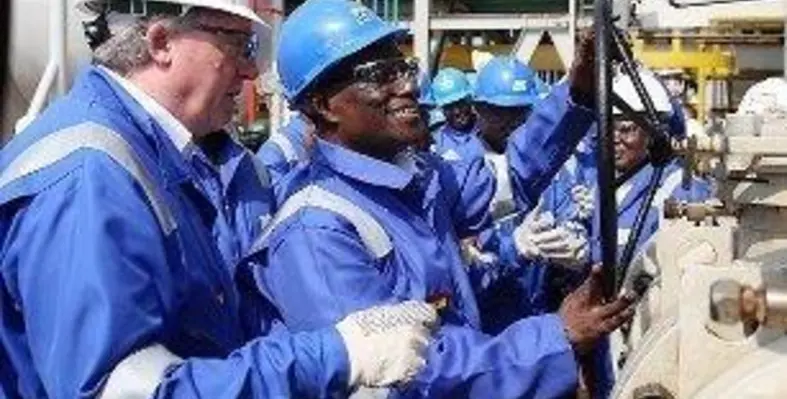Ghana’s oil: rising production and a new field
Ghana’s new Jubilee field is due to reach full production in August, according to Tullow, the UK-Irish company which operates the field. Production in July exceeded 80,000 barrels/day from seven wells, and the plateau rate of 120,000 barrels/day should be reached in August. The company was working at presstime on bringing on stream the last two wells in the Phase 1 development of the field.
Jubilee is performing “as anticipated”, according to Tullow’s engineers. Water-injection at the field – necessary for pressure-support – was running at 145,000 barrels/day at presstime and is due to rise to 230,000 barrels/day over the second-half of the year. Gas compression facilities are now fully-commissioned, allowing nearly 2.3mn cubic metres/day of gas to be pumped back into the reservoir.
A plan for the next phase of the Jubilee development, designated Phase 1A, is to be submitted to the government in August. Tullow and its partners in the field are expecting to sanction the investment in the fourth quarter of the year and to start drilling additional wells early next year. Phase 1A includes up to eight new production and injection wells, which will be drilled by Transocean’s Sedco Energy drilling unit – a fifth-generation dynamically-positioned deepwater facility, recently contracted by Tullow. First production under the Phase 1A plan should be achieved in mid-2012, with the additional flow maintaining the field’s plateau rate until 2015.
Enyenra-Tweneboa
In 2015, Ghana’s next large oil development is due to start flowing. The new field will be Enyenra-Tweneboa – the two original discoveries are now viewed as one large accumulation. Tullow says it will submit a development plan to the government in the first half of 2012, and it aims to produce first oil two-and-a-half years after sanction.
Although appraisal drilling at Enyenra-Tweneboa is still under way, Tullow is carrying out engineering work for the development in parallel with appraisal. The firm expects to award front-end engineering design contracts this year covering the field’s floating production, storage and offloading (FPSO) vessel and its subsea facilities. Engineers say they will need an FPSO with an oil production capacity of 75,000-125,000 barrels/day, and with extensive gas-handling facilities. The gas will be cycled back to the reservoirs to maximise liquids production.
A new oil discovery raises hopes for deeper reservoirs in Ghana’s offshore. Light crude has been found with Banda-1 well, which was the first well to target a deep, Cenomanian-age reservoir in the West Cape Three Points licence. The well, drilled by the Kosmos-Tullow group about 10 kilometres southeast of the Odum field, found a three-metre payzone holding 40°API oil. Banda-1 also showed over 100 metres of potentially oil-bearing sandstone rocks. The well was drilled by the Atwood Hunter semi-submersible, working in 921 metres of water.
Cameroon
Plans for a liquefied natural gas (LNG) export project moved forward in July when an outline agreement was signed by the government’s Société Nationale de Hydrocarbures and France’s GDF Suez. The agreement covers the terms on which gas will be supplied to the planned facility. The LNG complex will be supplied through an aggregation scheme, with gas collected from various fields in the country.
Equatorial Guinea
The government’s gas company, Sonagas, announced a plan to use gas from the Zafiro oilfield for fertiliser manufacture. International partners are being sought for the fertiliser complex, which will be constructed on Bioko island. Meanwhile, Sonagas says the final investment decision for the construction of the second train at the country’s liquefied natural gas complex, also on Bioko, will be taken next year. If the go-ahead is given, the new train could be producing in 2016.
Sénégal and Guinée-Bissau
A deepwater area held jointly by the two countries is seeing its first well. Ophir Energy is drilling into the Kora prospect, in water 2,620 metres deep, which is estimated to hold as much as 450 million barrels of oil. The well is in the AGC Profond licence, in a formerly-disputed area now administered by the two countries’ Agence de Gestion et de Coopération. US firm Noble Energy is financing much of the cost of the well, and has the right to take over as operator if a discovery is made.












